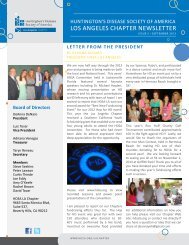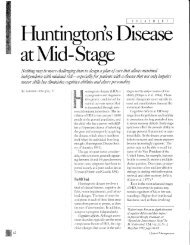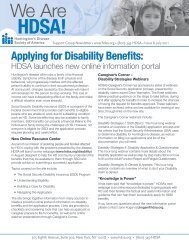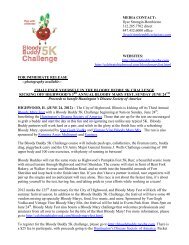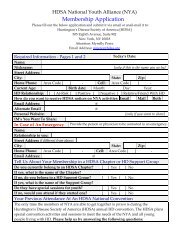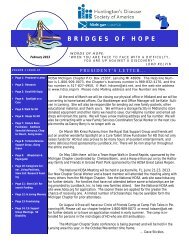Understanding Behavior in HD.final.8-18-05 - Huntington's Disease ...
Understanding Behavior in HD.final.8-18-05 - Huntington's Disease ...
Understanding Behavior in HD.final.8-18-05 - Huntington's Disease ...
You also want an ePaper? Increase the reach of your titles
YUMPU automatically turns print PDFs into web optimized ePapers that Google loves.
30<br />
another emotion. Typically when an <strong>in</strong>dividual experiences anger the underly<strong>in</strong>g feel<strong>in</strong>g is disappo<strong>in</strong>tment,<br />
grief, hurt, frustration or anxiety.<br />
• Frustration, irritability, anger and temper outbursts are expressed <strong>in</strong> response to a true feel<strong>in</strong>g, but with<br />
<strong>HD</strong> they become exaggerated due to a loss of control from the caudate.<br />
COPING STRATEGIES FOR FRUSTRATION<br />
• An awareness of the person’s capabilities is very important so that he/she is encouraged to be as<br />
<strong>in</strong>dependent as possible and is allowed to take risks without constantly expos<strong>in</strong>g him/herself to failure.<br />
Consider a “happy medium” of responsibilities. A non-<strong>in</strong>stitutionalized adult should be responsible for<br />
someth<strong>in</strong>g. Choose tasks that are appropriate (e.g., water a few plants, sweep a small area) but not<br />
overwhelm<strong>in</strong>g (weed the garden, clean the whole house). Close attention should be paid to the signals,<br />
verbal or nonverbal, that the patient is upset or want<strong>in</strong>g someth<strong>in</strong>g so that he/she does not have to get to<br />
the stage of mak<strong>in</strong>g a fuss before receiv<strong>in</strong>g attention.<br />
• Knowledge of the person and sensitivity to his/her needs means that some situations can be anticipated<br />
and potential frustration defused. It may be possible to identify situations that trigger frustration and either<br />
avoid them or provide diversional activities.<br />
• Often an overachiever needs help to give up peripheral responsibilities. For example, one caregiver<br />
encouraged his wife, “Let’s ask Julie to take over the telephone cha<strong>in</strong> for the women’s auxiliary. Of course,<br />
you will still try to go to as many meet<strong>in</strong>gs as possible.”<br />
COPING STRATEGIES FOR IRRITABILITY<br />
• Restructure the person’s <strong>in</strong>teractions, expectations, and responsibilities. Such restructur<strong>in</strong>g may need to<br />
take place frequently as more activities become difficult.<br />
• Family members and caregivers should learn to respond diplomatically, acknowledg<strong>in</strong>g the patient’s<br />
irritability as a symptom. Confrontations and ultimatums should be avoided unless the issue is crucial. The<br />
environment should be as calm and structured as possible.<br />
• In addition to support by cl<strong>in</strong>icians, caretaker/family support groups can be <strong>in</strong>valuable, both <strong>in</strong> provid<strong>in</strong>g<br />
emotional comfort and <strong>in</strong> shar<strong>in</strong>g strategies that members have found effective <strong>in</strong> their own households.<br />
COPING STRATEGIES FOR TEMPER OUTBURSTS<br />
• Redirect the <strong>HD</strong> person away from the source of anger.<br />
• Try to identify circumstances that trigger temper outbursts and then avoid them.<br />
• Assess your own expectations regard<strong>in</strong>g the <strong>HD</strong>-affected <strong>in</strong>dividual. A family member may be unwill<strong>in</strong>g or<br />
unable to accept the patient’s new limitations. Therefore, there must be a restructur<strong>in</strong>g of <strong>in</strong>teractions,<br />
expectations and responsibilities.<br />
• Confrontations and ultimatums should be avoided.



